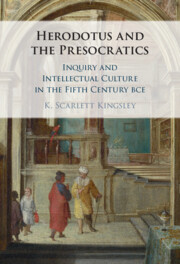5 results
A change of heart? Theophilos on his deathbed
-
- Journal:
- Byzantine and Modern Greek Studies / Volume 48 / Issue 1 / April 2024
- Published online by Cambridge University Press:
- 08 March 2024, pp. 82-99
- Print publication:
- April 2024
-
- Article
-
- You have access
- Open access
- HTML
- Export citation

Herodotus and the Presocratics
- Inquiry and Intellectual Culture in the Fifth Century BCE
-
- Published online:
- 07 March 2024
- Print publication:
- 14 March 2024
25 - Callisthenes, Chares, Nearchus, Onesicritus and the Mystery of the Royal Journals
- from Part III - The Historical and Biographical Tradition
-
-
- Book:
- The Cambridge Companion to Alexander the Great
- Published online:
- 04 January 2024
- Print publication:
- 18 January 2024, pp 406-422
-
- Chapter
- Export citation
Xenophon's Anabasis from Character to Narrator
-
- Journal:
- The Journal of Hellenic Studies / Volume 132 / November 2012
- Published online by Cambridge University Press:
- 06 September 2012, pp. 23-40
- Print publication:
- November 2012
-
- Article
- Export citation
38 - History
- from PART VI - LATER PRINCIPATE
-
-
- Book:
- The Cambridge History of Classical Literature
- Published online:
- 28 March 2008
- Print publication:
- 18 March 1982, pp 732-754
-
- Chapter
- Export citation

